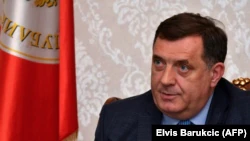Bosnian elections overshadowed by protests over alleged murder cover-ups
| Publisher | Radio Free Europe/Radio Liberty |
| Publication Date | 6 October 2018 |
| Cite as | Radio Free Europe/Radio Liberty, Bosnian elections overshadowed by protests over alleged murder cover-ups, 6 October 2018, available at: https://www.refworld.org/docid/5c34a6aa4.html [accessed 31 October 2019] |
| Disclaimer | This is not a UNHCR publication. UNHCR is not responsible for, nor does it necessarily endorse, its content. Any views expressed are solely those of the author or publisher and do not necessarily reflect those of UNHCR, the United Nations or its Member States. |
2018-10-06
By RFE/RL
 Bosnian Serb leader Milorad Dodik
Bosnian Serb leader Milorad Dodik
A weekend general election in Bosnia is being overshadowed by protests attended by tens of thousands in the country's two largest cities and organized by a pair of fathers demanding the truth about the alleged murders of their sons.
Final rallies by political candidates ahead of the October 7 presidential and parliamentary elections were scheduled to occur on the evening of October 5 in major cities, but the Alliance for Victory – the main opposition bloc in the country's autonomous, predominantly Serbian, entity, Republika Srpska – cancelled its gathering in Banja Luka, as did two opposition parties in Sarajevo, in a show of solidarity with the protesters.
The two fathers – Davor Dragicevic, a Serb from Banja Luka, and Muriz Memic, a Muslim Bosniak from Sarajevo – said they decided to hold simultaneous protests before the vote to put pressure on the judiciary to speed up inquiries into their sons' deaths.
The fathers accuse Bosnian authorities of being involved in what they say were murders that were concealed by police and prosecutors for political reasons.
Widespread public support for the two grieving fathers has bridged Bosnia's ethnic divisions, reflecting discontent with a political system and judiciary mired in corruption and entrenched partisanship in the 23 years since the country's 1992-95 war ended.
"Let's make the revolution with pens," Memic urged several thousand protesters in Sarajevo who chanted "We want justice" and carried placards demanding "Justice for Dzenan," the man's son.
Dzenan Memic, 22, died of wounds to his head in 2016. Prosecutors at first said he was murdered, but later declared that new evidence showed he had been killed in a car accident – a conclusion never accepted by his family.
In Banja Luka, Dragicevic and his supporters have held daily protests for more than six months over the death of his son David, 21, who was found dead in March in a creek in Banja Luka a week after he went missing.
The father and protesters claim he was captured, tortured, and brutally murdered. The police said he drowned and had alcohol and drugs in his system.
"The Interior Ministry organized the murder of David Dragicevic," his father claimed at the October 5 protest attended by as many as 20,000 people, naming the officials allegedly involved. "This is a criminal state, criminal police."
The crowd chanted "Killers!" and booed when he mentioned Bosnian Serb leader Milorad Dodik, whose SNSD party held its final rally at a square just a few miles away attended by a few thousand supporters.
Dodik has said he sympathizes with the Dragicevic family's pain, but the that the son's death is a matter for prosecutors.
The main focus in the run-up to the October 7 elections has been on Dodik's bid to win a seat in Bosnia's multiethnic presidency. Dodik advocates the eventual separation of Serbs from the rest of the country – the same goal that helped fuel the country's 1990s war.
The ongoing protests over Dragicevic's son's death have been seen as a challenge to Dodik. Republika Srpska authorities have claimed that they are part of a plot to undermine Dodik and accuse the opposition of trying to make political gains by allying with the protesters.
The United States last year imposed sanctions on Dodik, who has accused the United States and Britain of funneling money to his opponents to weaken the Serb mini-state.
Russian President Vladimir Putin has endorsed Dodik, who as a member of the Bosnian presidency would likely seek to strengthen Russia's role in in the Balkan country.
With reporting by AP and Reuters
Link to original story on RFE/RL website
